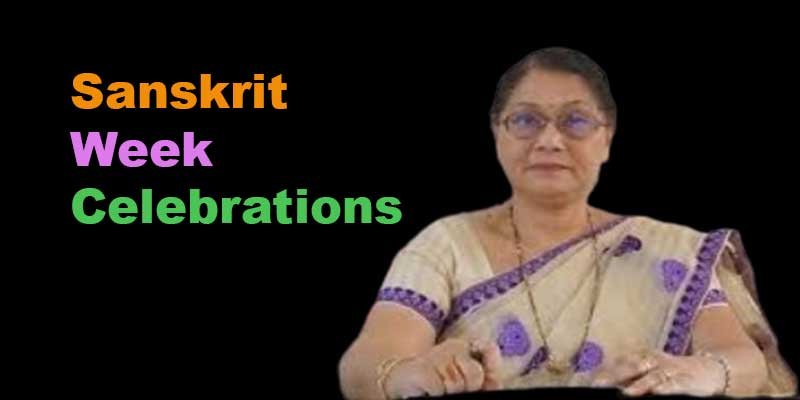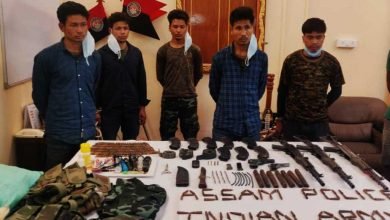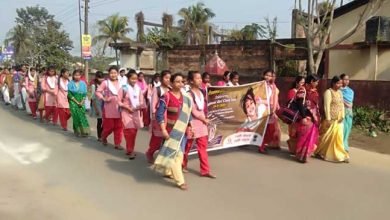Assam: Sanskrit Week Celebrations

Guwahati: Prof. Malinee Goswami, Vice Chancellor, Assam Women’s University, Jorhat and Prof.(Dr.) S P Singh, Vice Chancellor, Royal Global University, Guwahati were the speakers on ‘Sanskrit Week Celebrations’ held by Royal Global University on 6 August 2020 on the topic ‘Reawakening of Indian Culture through Sanskrit’. They was joined in their deliberations by Prof.A.K.Buragohain, Chairperson-Academics, Prof. P.J.Mahanta, Dean, RSHSS, faculty, staff and students of RGU as well as from across India. It was moderated by Ms. Stuti Goswami, Asst.Prof., RSL.
Prof.Singh, deliberating on ‘God’s Language’, spoke on Sanskrit, an old Indo-Aryan Language and its importance across all spectrums of life; 18 Sanskrit Universities in India; used extensively across the world for its varied inscriptions on science, maths, poetry, drama, philosophy; 2nd official language of Uttarakhand and Himachal Pradesh; predominant language of Hindu philosophy, principal texts of Buddhism & Jainism and how Sanskrit is being used across Europe and other countries.
He spoke on Sanskrit being the ancestor of the Prakrits and Pali and consequently of modern languages like Assamese, Marathi, Punjabi, Kashimri, etc. He further spoke on the body of Sanskrit literature encompassing a rich tradition of philosophical and religious texts, as well as poetry, music, drama, scientific, technical and other texts and how in the ancient era, Sanskrit compositions were orally transmitted by methods of memorization of exceptional complexity, rigour and fidelity.
He spoke on Sanskrit being a living language; is a primary language in some villages in Karnataka and the new Education Policy 2020 will rightfully revive/ give it a place of honour in Indian Education system. It also continues to be widely used as a ceremonial and ritual language in Hinduism and some Buddhist practices such as recitation of hymns and chants. An erudite speaker, he spoke about his continuous quest for knowledge through this ancient language and how he is still connected to Universities teaching Sanskrit.
Dr.Goswami, with an impressive 32 books authored and 231 research publications, spoke on the existence of Sanskrit language, the language of high culture and the elite, before 3500 BC; and how it connotes a work that has been well prepared, pure and perfect, polished, sacred. She spoke on the history of Sanskrit belonging to the Indo-European family of languages and how it is one of three ancient documented languages that arose from a common root language now referred to as Proto-Indo-European language.
It is the primary liturgical language of Hinduism and the predominant language of most works of Hindu philosophy as well as some of the principal texts of Buddhism and Jainism. Sanskrit, in its variants and numerous dialects, was the lingua franca of ancient and medieval India.
Sanskrit is traceable to the 2nd millennium BC in a form known as Vedic Sanskrit, with the Rigveda as the earliest-known composition; a language used in science, maths, plastic surgery, engineering, poetry, drama,etc., and depicting Indian culture. She empathized on how Sanskrit is one of the 22 languages listed in the Eighth Schedule of the Constitution of India with more than 3,000 Sanskrit works which have been composed since India’s independence; Sanskrit words listed in the English Dictionary; how it has significantly influenced the grammar, phonology and vocabulary of the Kannada, Telugu, Tamil and Malayalam languages of South India.
Speaking on the reawakening of Indian Culture through Sanskrit, she stated that the very foundation, fundamentals, ideologies, ideas of Indian culture is in Sanskrit language. Lofty ideals like ‘Satya Mave Jayete’, an eternal phrase in Sanskrit is inscribed in Indian currency, Ashoka stupa and has kept the Indians in a tight knot. 700 years of foreign rule,as in Moghuls and Britishers, had distorted the Indian language which can be reorganized/restored to its previous glory as seen in present day usage of it in Ayurveda, science and technology. She also mentioned that uniform Indian cultural ideas are preserved in Sanskrit literature and language.










